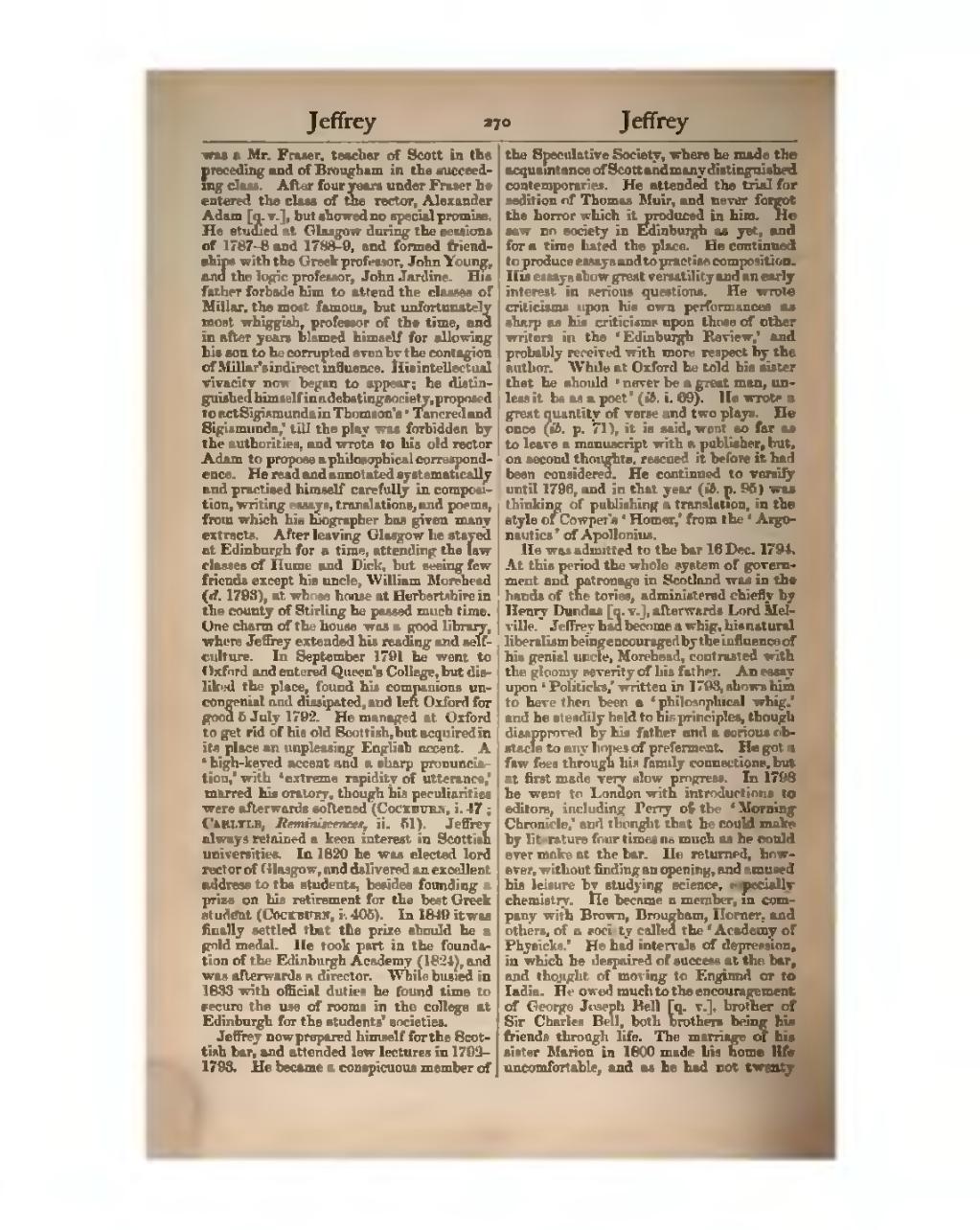was a Mr. Fraser, teacher of Scott in the preceding and of Brougham in the succeeding class. After four years under Fraser he entered the class of the rector, Alexander Adam [q. v.], but showed no special promise. He studied at Glasgow during the sessions of 1787–8 and 1788–9, and formed friendships with the Greek professor, John Young, and the logic professor, John Jardine. His father forbade him to attend the classes of Millar, the most famous, but unfortunately most whiggish, professor of the time, and in after years blamed himself for allowing his son to be corrupted even by the contagion of Millar's indirect influence. His intellectual vivacity now began to appear; he distinguished himself in a debating society, proposed to act Sigismunda in Thomson's ‘Tancred and Sigismunda,’ till the play was forbidden by the authorities, and wrote to his old rector Adam to propose a philosophical correspondence. He read and annotated systematically and practised himself carefully in composition, writing essays, translations, and poems, from which his biographer has given many extracts. After leaving Glasgow he stayed at Edinburgh for a time, attending the law classes of Hume and Dick, but seeing few friends except his uncle, William Morehead (d. 1793), at whose house at Herbertshire in the county of Stirling he passed much time. One charm of the house was a good library, where Jeffrey extended his reading and self-culture. In September 1791 he went to Oxford and entered Queen's College, but disliked the place, found his companions uncongenial and dissipated, and left Oxford for good 5 July 1792. He managed at Oxford to get rid of his old Scottish, but acquired in its place an unpleasing English accent. A ‘high-keyed accent and a sharp pronunciation,’ with ‘extreme rapidity of utterance,’ marred his oratory, though his peculiarities were afterwards softened (Cockburn, i. 47; Carlyle, Reminiscences, ii. 51). Jeffrey always retained a keen interest in Scottish universities. In 1820 he was elected lord rector of Glasgow, and delivered an excellent address to the students, besides founding a prize on his retirement for the best Greek student (Cockburn, i. 405). In 1849 it was finally settled that the prize should be a gold medal. He took part in the foundation of the Edinburgh Academy (1824), and was afterwards a director. While busied in 1833 with official duties he found time to secure the use of rooms in the college at Edinburgh for the students' societies.
Jeffrey now prepared himself for the Scottish bar, and attended law lectures in 1792–1793. He became a conspicuous member of the Speculative Society, where he made the acquaintance of Scott and many distinguished contemporaries. He attended the trial for sedition of Thomas Muir, and never forgot the horror which it produced in him. He saw no society in Edinburgh as yet, and for a time hated the place. He continued to produce essays and to practise composition. His essays show great versatility and an early interest in serious questions. He wrote criticisms upon his own performances as sharp as his criticisms upon those of other writers in the ‘Edinburgh Review,’ and probably received with more respect by the author. While at Oxford he told his sister that he should ‘never be a great man, unless it be as a poet’ (ib. i. 69). He wrote a great quantity of verse and two plays. He once (ib. p. 71), it is said, went so far as to leave a manuscript with a publisher, but, on second thoughts, rescued it before it had been considered. He continued to versify until 1796, and in that year (ib. p. 95) was thinking of publishing a translation, in the style of Cowper's ‘Homer,’ from the ‘Argonautics’ of Apollonius.
He was admitted to the bar 16 Dec. 1794. At this period the whole system of government and patronage in Scotland was in the hands of the tories, administered chiefly by Henry Dundas [q. v.], afterwards Lord Melville. Jeffrey had become a whig, his natural liberalism being encouraged by the influence of his genial uncle, Morehead, contrasted with the gloomy severity of his father. An essay upon ‘Politicks,’ written in 1793, shows him to have then been a ‘philosophical whig,’ and he steadily held to his principles, though disapproved by his father and a serious obstacle to any hopes of preferment. He got a few fees through his family connections, but at first made very slow progress. In 1798 he went to London with introductions to editors, including Perry of the ‘Morning Chronicle,’ and thought that he could make by literature four times as much as he could ever make at the bar. He returned, however, without finding an opening, and amused his leisure by studying science, especially chemistry. He became a member, in company with Brown, Brougham, Horner, and others, of a society called the ‘Academy of Physicks.’ He had intervals of depression, in which he despaired of success at the bar, and thought of moving to England or to India. He owed much to the encouragement of George Joseph Bell [q. v.], brother of Sir Charles Bell, both brothers being his friends through life. The marriage of his sister Marion in 1800 made his home life uncomfortable, and as he had not twenty
